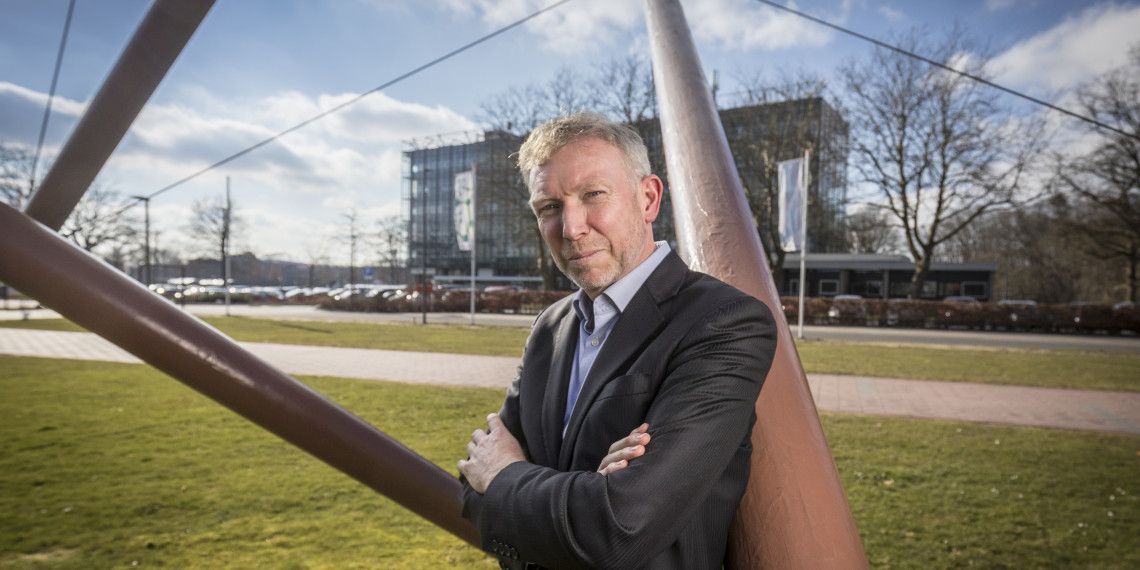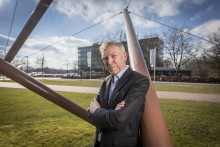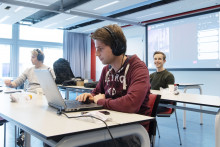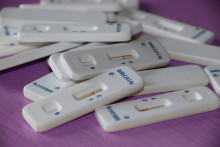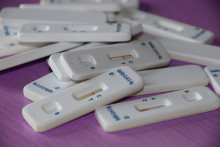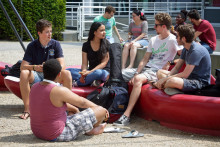Victor van der Chijs sits down in his garden for the telephone conversation. Everyone is working from home, including the president of the Executive Board. These are the first hours of sun, because he has barely been able to enjoy the lovely weather yet. ‘I continuously have meetings and besides, I am receiving three times as many emails as usual. At the start of the period of working from home, I still had the romantic notion that I might be able to fix a screw into the wall between tasks, but nothing came of that.’
‘Are you doing okay?’, Van der Chijs asks over the telephone. The lack of face-to-face contact is a big loss, asserts the president of the Executive Board. ‘I always pay close attention to people’s demeanour, how they feel. Are they happy? Do they look uneasy? I try to walk around the campus as much as possible. Visit the labs and faculties. I want to know how the campus feels. It is far more difficult via digital channels. I am meanwhile getting square eyes from all the meetings via video link. The new situation demands resilience. I see everyone making the best of it. I am proud of that: the way the UT community is facing this crisis.’
Have you not had any sleepless nights yet as the president of the Executive Board during a time of crisis?
‘No. On the contrary. As I said, my schedule is completely full. When I go to bed at night, I cannot remember my head hitting the pillow. I think we are in control at UT. My adrenalin levels were pretty high the first few days. But that is actually good. It keeps you on your toes. We need to make many decisions. Also a good sign. It means our organisation is active. Besides, things are happening fast. Never waste a good crisis is an expression I have heard numerous times in recent weeks.’
We won’t return to normal after the crisis?
‘I don't know what the new normal will be. The new normal will be different in any case. Take digitisation. We are suddenly making huge strides during the corona crisis. We have worked incredibly hard. Something we would normally take five years to do is now organised within a few weeks. The UT is far more digitally adept than we thought and the new way of working actually also produces new ways of interaction. That is rewarding to see. I know this new way of working will certainly have consequences for the future. We will ask one another: is it really necessary to arrange this event physically? far more often.’
'As a university, we are not here to offer income support'
‘At the same time, the UT will not become a completely digital university. As a technical university, we are in a unique situation with a great deal of research and education taking place in laboratories. The infrastructure of the physical campus remains indispensable. The social aspect of the campus is and remains incredibly important as well. The UT is not a study and research factory. We are a community. That is a great asset. I see that again in this crisis too: the UT community looks after its own.’
International students are having a difficult time during this crisis. They are experiencing financial problems due to the loss of part-time jobs, for example, or are completely alone in a foreign country because of the lockdown…
‘We are devoting our full attention to it. We naturally want to know how they are doing. At the same time, we cannot call everyone individually. That is why I tell students and employees with problems: let us know. We can help. However, the issues vary widely. We need to deliver a customised solution. Fortunately, there has been no increase in psychological complaints as far as we know. Levels are normal. Above all, I want to appeal to our small, tight-knit community. Call one another more often. Send a message. In short, look after one another.’
And the financial problems that non-European students in particular appear to be experiencing?
‘There are students with serious financial problems. The university has already assisted them to a limited extent. Let me be clear about one thing. As a university, we are not here to offer income support. We cannot and may not offer such assistance. I am therefore very pleased with the emergency support from Twente University Fund for students who are struggling with serious financial problems. But ultimately, extra structural support will need to be arranged nationally by the Ministry of Education.’
Are there statistics for the number of students struggling with financial problems due to the corona crisis?
‘No. Help is given via different channels and besides, there are privacy laws. The problems experienced vary from one person to another. One becomes anxious at the prospect of a bank balance of fifty Euros, while the other only become anxious when a letter from the bank comes through the door.’
What consequences will the corona crisis have for the UT’s internationalisation policy?
‘Let me clarify that our philosophy on internationalisation will remain the same. The UT wants to offer an international classroom in future too, with a healthy mix of Dutch, European and non-European students. We regard such an international classroom as an enrichment. How we can achieve this healthy mix of students in the future too is an important issue.’
'This is a nightmare for scenario analysts'
‘There is no doubt that the crisis will have an effect on internationalisation. Although we are not seeing that reflected in preliminary enrolments for studies at the UT yet. On 7 April this year, these figures were more or less comparable to last year. There is no reason for concern as far as that goes. But one doesn’t know what the situation will be like in two months’ time when students need to make firm arrangements. We are now primarily busy firefighting in respect of our policy. For example, we cannot host the mandatory language test. We need to find a digital alternative for that.’
‘There are various scenarios for the long term. All bets are off. Will the 1.5-metre rule become the ‘new normal’? What does that mean for our infrastructure, our education and research, and how we work together? And: what do we do about the Kick-In, for example? No decision has been made about that yet. My expectation is that we will have an on-and-off situation. The policy will keep being amended according to the number of people infected. Of course, this is a nightmare for scenario analysts. We will have to try to be agile as a university. Managing a university used to be delightfully predictable now and then. That has now changed completely.’
The open days were only cancelled at the last minute. What do you think in retrospect? Did something go wrong?
‘No, nothing went wrong. Wide-ranging discussions were held and we were ultimately able to make a weighted decision. Initially, the decision was: we will allow the open days to go ahead. As a university, we follow government guidelines and, as an academic institution, we take the Netherlands National Institute for Public Health and the Environment (RIVM) very seriously. The Netherlands had not yet imposed a lockdown at that point. The situation changed dramatically within one or two days. Like two other universities, the UT’s problem was that the open days were scheduled for precisely that week. We opted for customisation in some cases. We fully understood that TechMed was unable to participate, because many of its employees work in healthcare.’
'It will primarily come down to customisation and improvisation in the coming months'
What are the financial consequences of this crisis for the university?
‘Little is known about the financial losses yet. There will be grave consequences for the university, that much is clear. At the same time, we are refraining from certain investments. The UT is trying to monitor what extra costs the university is incurring due to the crisis as closely as possible. Whether we can utilise Van Rijn funds to cushion the blow? No, that money has already been spent. To be honest, there are other decisions that demand priority at the moment.’
What decisions?
‘Hundreds. Yesterday, the decision was made to postpone the participation council elections, for example. And yesterday, the decision was made to partially open laboratories. Many researchers and students wish to continue their research. But we had to make the decision to open the labs for corona-related research only.’
Many (overseas) researchers come to Twente specially to do their research in the lab. Their research, as well as social contact with colleagues, has been completely curtailed because of the crisis…
‘We are well aware of that. But it is simply not possible yet. There are insufficient Emergency Responders in the building to guarantee a safe work environment, for example. Besides, the government guidelines are very clear. We may learn something from corona-related research that means we can give the go-ahead for other research in the near future. For the time being, it would be irresponsible to open the laboratories.’
And the rest of the UT? When will the campus ‘open’ again?
‘The government says: we may be able to relax the measures at the end of April. I don’t think the university stands much of a chance. Many students come by public transport and there is a serious risk of infection on full buses and trains. It will primarily come down to customisation and improvisation in the coming months. I want to emphasise once again that I am particularly proud of what our employees and students have achieved to date.’
Something is rattling in the background. ‘I just need to go and see what is happening in the kitchen.’ That too is part of working from home. Improvisation, a sense of community and speculation appear to be the watchwords in this crisis. A fourth could be added to that list: hard work. ‘It certainly is a slog’, says Van der Chijs. ‘And that is fine too. I hope to have one or two completely free days this Easter weekend in any case. Maybe, just maybe, I can still fix that screw into the wall.’


